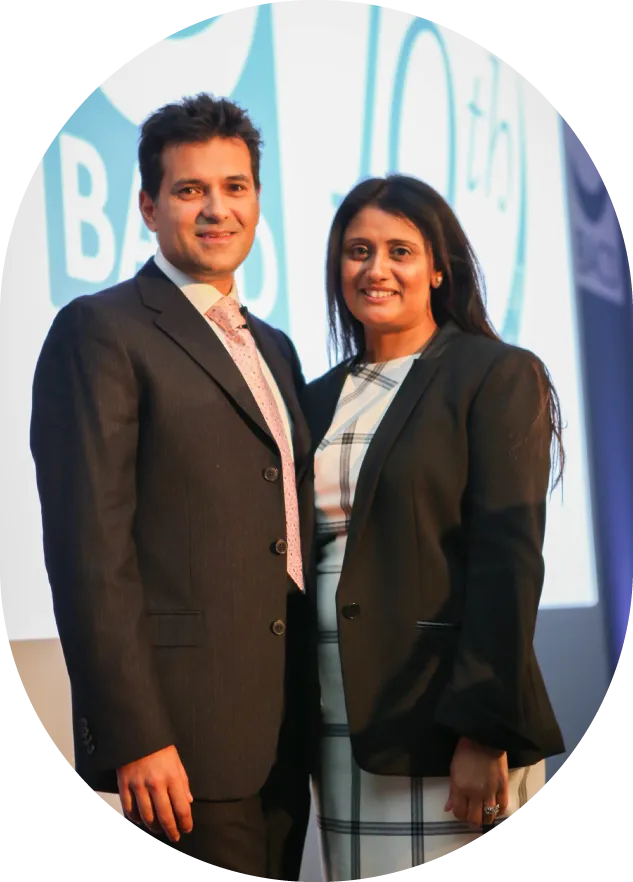Dr Rachel Derby and Dr Neil Evans
Creating Stability and Success: How DWB Guided Chapel Dental’s Evolution

Q: Can you start by sharing what initially motivated you to purchase your own dental practice?
Dr Rachel Derby: Our journey into practice ownership began unexpectedly. In November 2019, a retiring dentist approached us with an offer to buy his practice. I was six months pregnant at the time and knew I was having a daughter. The idea of owning a practice instantly clicked with me; I wanted to be a role model for my daughter, showing her that it's possible to balance a successful career with motherhood. It wasn't about getting rich quickly—if anything, we learned that's a misconception—but about building something meaningful and secure for our family. This desire to create a stable, thriving practice for her became our 'Why', a critical motivator during challenging times.
Q: What factors led you to realise that you needed guidance in managing a business?
Dr Neil Evans: We have both worked diligently to become exceptional dental practitioners, investing significantly in our careers, including postgraduate education. While we were committed to continuing to provide excellent treatment and care for our patients, we lacked formal business education. When we started looking for guidance, we realised we needed more than just business advice—we needed someone who understood the unique challenges of running a dental practice. DWB, led by Rahul and Bhavna Doshi, was the perfect fit because they're also a husband-and-wife team who have successfully managed multiple practices. We saw ourselves in them and aspired to emulate their success. They offered practical, hands-on strategies that resonated with us, and their comprehensive understanding of both the clinical and business sides of dentistry made them stand out.
Q: How did you prepare mentally for practice ownership?
Dr Rachel Derby: One of the first lessons with DWB was about adopting the mindset of an owner, which was crucial for us. The Doshis emphasised the psychology of sales and the importance of leadership, which were areas we hadn't fully explored before. We spent a lot of time watching DWB online support videos and discussing leadership strategies, which gradually shifted our mindset. It wasn't just about being good dentists; it was about leading a team and creating a positive, productive environment for everyone. This mindset shift was fundamental in preparing us for the responsibilities of ownership, from managing staff and building systems that ensure smooth operations.
Q: Can you share some impactful changes that you made to your practice?
Dr Neil Evans: One of the most beneficial strategies was the emphasis on creating a structured patient journey, which has been revolutionary for us. We realised the importance of clear communication, both with our team and our patients. Under DWB's guidance, we set up a seamless flow from the initial phone call to the treatment planning session. Our receptionist, Erica, was initially sceptical about the telephone scripts, but she quickly saw the difference they made. We moved away from the traditional approach of discussing treatment plans in the clinical room, which can be intimidating for patients. Instead, we use a more relaxed, non-clinical setting to discuss treatment options, which has significantly improved patient comfort and understanding of the treatment advocated. This change not only enhanced the patient experience but also increased our case acceptance rates.
Implementing systems for handling patient inquiries, follow-ups, and treatment discussions has streamlined our operations and improved patient satisfaction. Another key strategy was focusing on the business aspects of dentistry—understanding financial metrics, optimising scheduling, and implementing effective marketing tactics. These strategies have helped us grow our practice sustainably and confidently.
Q: How have you transformed your leadership style and team dynamics?
Dr Rachel Derby: During one of Bhavna's one-to-one coaching sessions, she emphasised the importance of hiring for attitude and how to nurture a positive team culture. We learned exactly what type of team dynamic and personality types we were working towards. This advice was invaluable during our initial hiring process, where we focused on finding team members who shared our values and vision. For example, Erica, our receptionist, had aspirations of becoming a Practice Manager and aligned well with our goals. Together, we coined the term "Bhavna'd," which describes the feeling of motivation and excitement after a session with DWB. This shared enthusiasm has been crucial in building a cohesive and motivated team. We also recognised the importance of continuous learning and development, not just for ourselves, but for our team members as well, ensuring that everyone grows together.
I continue to utilise many of the communication and leadership skills I developed, which are essential for my roles in industry leadership, including serving as President of the British Association of Private Dentistry. My role focuses on guiding the mission to support dental professionals in the private sector and promote the delivery of high-quality dentistry. Driven by this commitment, I aspired to create a practice that truly highlights these values.
Q: Tell us about your community engagement.
Dr Neil Evans: Our practice, Chapel Dental in High Wycombe, had a challenging reputation when we took over, partly due to its previous state and community perception. DWB helped us understand the importance of integrating into the local community, especially in a village setting where everyone knows each other. We've engaged in various activities, such as hosting a Macmillan coffee morning, which raised a substantial sum and brought in new patients. We've also participated in local events and supported school projects, helping to rebuild our practice's reputation. This community engagement has not only improved our practice's image but also helped us connect with residents on a more personal level.
Q: How have you balanced the demands of running a practice with raising a family?
Dr Rachel Derby: Balancing practice ownership with family life is challenging, but we were provided valuable advice on achieving a healthy work-life balance. Bhavna shared her experiences of managing a practice while raising children, which was incredibly reassuring. She emphasised the importance of setting boundaries and prioritising tasks that align with our long-term goals. I love her customisable, unique time management systems. This advice has been instrumental in helping us manage our time effectively, ensuring that we can be present for our daughter while also running a successful practice. It's about making intentional choices and sometimes saying no to opportunities that don't align with our priorities.
Q: Reflecting on your journey, tell us about your expectations.
Dr Rachel Derby: The coaching has far exceeded our expectations, particularly in how it has empowered us as leaders and business owners. The guidance we received has not only transformed our practice but also given us the confidence to pursue further growth opportunities. Winning awards, such as Best Young Dentist and Best Practice, and getting published in dental journals were milestones we hadn't anticipated before starting the program. These achievements have been incredibly validating and have reinforced our commitment to excellence. The coaching has been more than just about business—it's been about personal growth and realising our full potential as dental professionals and entrepreneurs.
Q: Can you elaborate on some key takeaways you experienced?
Dr Rachel Derby: Absolutely. The coaching program with DWB provided us with so many strategies that significantly impacted both our practice and personal growth:
1. Mindset: One of the most crucial aspects was developing an owner's mindset. Transitioning from being purely clinicians to business leaders required a shift in thinking. We learned to view our practice not just as a place to work but as a business that needed strategic direction and management. This mindset shift helped us approach challenges with a broader perspective, focusing on long-term goals and sustainability.
2. Leadership Skills: Effective leadership was another primary focus. The coaching emphasised the importance of creating a cohesive and motivated team. We learned to communicate clearly, set expectations, and foster a positive work environment. This not only improved team morale but also enhanced overall productivity and patient satisfaction.
3. Patient-Centric Focus: Understanding the patient's journey became a central theme. The coaching taught us to view every interaction from the patient's perspective, which helped us build trust and deliver high-quality care. We redesigned our patient experience to ensure that each step, from the initial phone call to treatment plan communication, was as comfortable and informative as possible.
4. Systems Implementation: Establishing structured systems was vital for efficient practice management. We implemented customised processes for operations, marketing, and patient management, which streamlined our workflow and improved consistency. This systematic approach has been essential in handling day-to-day activities more effectively and ensuring a seamless experience for both patients and staff.
5. Work-Life Balance: Balancing the demands of practice ownership with family life was another crucial area. The coaching provided us with strategies to manage our time more effectively and set boundaries, enabling us to maintain a fulfilling and sustainable career without sacrificing personal time. This has been particularly important as we navigate the challenges of raising a family alongside running a business.
Bonus: Lastly, and most importantly, the coaching gave us confidence in our abilities. Rahul and Bhavna empowered us to see our potential beyond what we initially believed possible. This newfound confidence has been instrumental in taking bold steps, whether it's entering awards, publishing clinical cases, or planning for future expansion. The support and guidance from DWB have truly transformed our outlook and capabilities as practice owners.
Q: What does the future hold for you and Chapel Dental?
Dr Rachel Derby: As we approach our second year of ownership, we feel well-prepared to face the challenges ahead. The honeymoon period is over, but we're more committed than ever to growing Chapel Dental and enhancing our services. We have a clear vision of where we want to go and how to get there, and we're excited about the possibility of expanding to another practice. The foundation we've built with DWB's guidance has set us up for continued success, and we're confident in our ability to navigate the complexities of practice ownership. Our journey with DWB has been transformative, and we're grateful for the support and insights that Rahul and Bhavna have provided.
Q: What advice would you give to other dentists considering DWB's coaching program?
Dr Neil Evans: Our advice is to trust the process and commit to it wholeheartedly. The insights and strategies provided by Rahul and Bhavna are invaluable and applicable to various aspects of practice management. Start the program even before you acquire your practice to lay a solid foundation. The focus on mindset, leadership, and patient-centric strategies will prepare you not only for the challenges but also for the opportunities that come with practice ownership. DWB is not just about improving your practice; it's about empowering you to achieve your full potential as a professional and as a leader. Sometimes, you don't know what you don't know, and learning from those who have successfully navigated the evolving dental field is invaluable. Bhavna and Rahul will not only guide you through overcoming current challenges but also equip you with the confidence to manage them in the future.







.svg)

